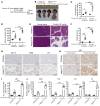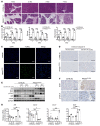Trypsin activity governs increased susceptibility to pancreatitis in mice expressing human PRSS1R122H
- PMID: 31550238
- PMCID: PMC6934224
- DOI: 10.1172/JCI130172
Trypsin activity governs increased susceptibility to pancreatitis in mice expressing human PRSS1R122H
Abstract
Currently, an effective targeted therapy for pancreatitis is lacking. Hereditary pancreatitis (HP) is a heritable, autosomal-dominant disorder with recurrent acute pancreatitis (AP) progressing to chronic pancreatitis (CP) and a markedly increased risk of pancreatic cancer. In 1996, mutations in PRSS1 were linked to the development of HP. Here, we developed a mouse model by inserting a full-length human PRSS1R122H gene, the most commonly mutated gene in human HP, into mice. Expression of PRSS1R122H protein in the pancreas markedly increased stress signaling pathways and exacerbated AP. After the attack of AP, all PRSS1R122H mice had disease progression to CP, with similar histologic features as those observed in human HP. By comparing PRSS1R122H mice with PRSS1WT mice, as well as enzymatically inactivated Dead-PRSS1R122H mice, we unraveled that increased trypsin activity is the mechanism for R122H mutation to sensitize mice to the development of pancreatitis. We further discovered that trypsin inhibition, in combination with anticoagulation therapy, synergistically prevented progression to CP in PRSS1R122H mice. These animal models help us better understand the complex nature of this disease and provide powerful tools for developing and testing novel therapeutics for human pancreatitis.
Keywords: Gastroenterology; Proteases.
Conflict of interest statement
Figures








References
Publication types
MeSH terms
Substances
Grants and funding
LinkOut - more resources
Full Text Sources
Medical
Molecular Biology Databases
Research Materials
Miscellaneous

